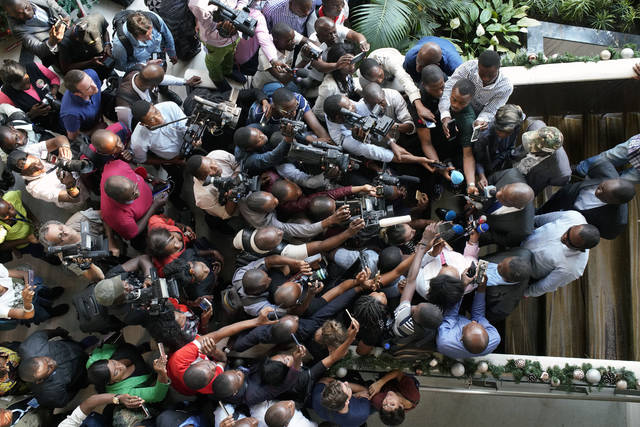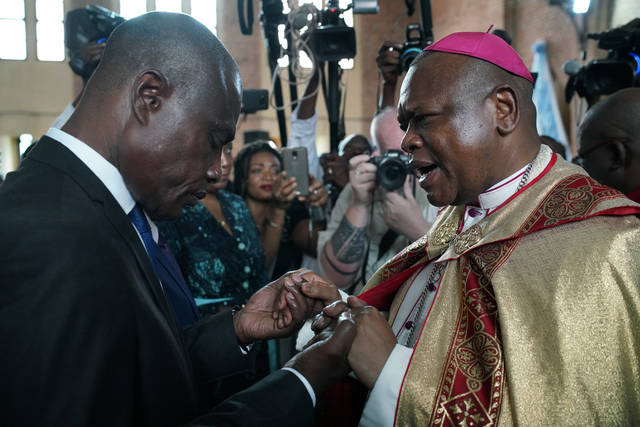KINSHASA, Congo — Congo’s top archbishop on Saturday urged peace on the eve of the country’s long-delayed presidential election , saying differences of opinion are no reason to “light the country on fire.” Hours later, the leading candidates failed to agree on a guarantee for a peaceful vote.
The archbishop of Kinshasa, Fridolin Ambongo, held a Mass in the capital attended by leading opposition candidate Martin Fayulu and a representative of ruling party candidate Emmanuel Ramazani Shadary. They and sole female candidate Marie-Josee Ifoku held hands during prayer in a spirit of reconciliation.
“Unfortunately, some of our compatriots give the impression they want to hold the country hostage to violence,” the archbishop told the congregation. “In no case will we permit these elections to become another opportunity to destroy Congo and shed the blood of Congolese who have bled too much for decades already.”
He also criticized the surprise decision by Congo’s electoral commission to bar some 1 million people from voting because of a deadly Ebola virus outbreak, calling it a “denial of justice.”
The residents of Beni and Butembo cities now must vote in March, long after Congo’s new president is inaugurated. Protests followed Wednesday’s announcement, and Congo’s health ministry and the World Health Organization said crucial virus containment work was suspended. The WHO chief warned against “prolonged insecurity,” saying a rise in new cases could follow.
In the sharpest statement yet by health workers, the International Rescue Committee on Saturday said it was forced to suspend Ebola response work, accusing Congo’s electoral commission of politicizing the outbreak.
“It is unacceptable that this disease is being used as a political ploy, putting aid workers in immediate danger,” the group’s vice president Bob Kitchen said, pointing out that the affected cities have large numbers of opposition supporters.
The election delay surprised many. Congo’s health ministry had said precautions were in place to allow people in the outbreak zone to vote, with electoral authorities involved in discussions. The opposition calls the delay the latest attempt by the ruling party to ensure that departing President Joseph Kabila’s preferred successor, Shadary, is elected.
“Our brothers and sisters in Beni and Butembo say they feel betrayed and abandoned by their leaders and they are right in doing so,” Kinshasa’s archbishop said. The Catholic church in Congo has been an outspoken critic of delays in the election, which was meant to take place in late 2016.
Sunday’s vote could bring Congo’s first peaceful, democratic transfer of power since independence from Belgium in 1960.
Later on Saturday, however, the three leading candidates and the electoral commission could not agree on the terms of a guarantee for a peaceful vote.
Fayulu and another opposition coalition led by Felix Tshisekedi said the electoral commission should guarantee that voting will take place in all polling stations, including in Beni and Butembo and a third community, Yumbi, that recently had deadly ethnic clashes. They said it should guarantee that all political parties’ witnesses are allowed to monitor the election and that voting results will be counted by hand.
Congo for the first time is using voting machines, which the opposition worries could open the door to manipulation.
Neither the electoral commission nor Shadary signed a guarantee with those conditions. “You can see the collusion between the two,” Fayulu said.
Adding to concerns that Congolese authorities were not yet ready to hold the election with just hours to spare, Fayulu noted reports of a truck accident on the road to Bandundu, east of the capital, that had put 15 polling stations out of operation.
“In what country do we have polling stations that have not received their equipment at 3 p.m. when the elections are supposed to be held the next day at 6 a.m.?” he asked.
As night fell at the other end of the country in Beni, a wooden cross had been placed on a road barricaded by a charred tree trunk. “Joseph Kabila,” it read.
———
Associated Press writer Al-Hadji Kudra Maliro in Beni contributed.
———
Follow Africa news at https://twitter.com/AP—Africa




